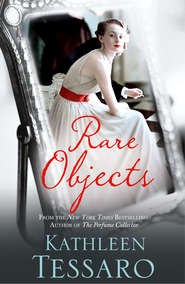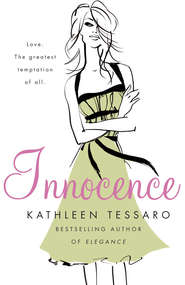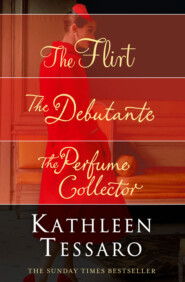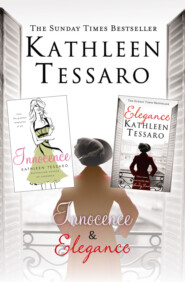По всем вопросам обращайтесь на: info@litportal.ru
(©) 2003-2024.
✖
The Debutante
Автор
Год написания книги
2018
Настройки чтения
Размер шрифта
Высота строк
Поля
She’d done it again – knocked him sideways as completely as if she’d kicked his chair out from under him. He was left reeling, grappling with desires that had long been dormant. And he resented it. As much as he loathed the numb monotony of his existence since his wife’s death, he hated the effect she had on him; it was narcotic, addictive. She left him longing for more of what he couldn’t have in the first place. For a moment he considered the possibility that she knew he was standing there; that she’d deliberately paraded herself in front of him.
Of course that was stupid.
Still, images piled up on themselves.
Stare at the sheep, dammit!
This is a job, he reminded himself, draining his coffee. Tomorrow it ended and then they would go back to London. Most likely she’d end up heading back to New York to that rich lover of hers.
The memory of her, naked and unaware, flashed up again. He pushed it firmly out of his mind.
He couldn’t even trust her.
This girl had no place in his life.
5 St James’s SquareLondon
12 September 1926
My darling, dearest Wren,
I am so, so grateful for your wonderful news and most of all that you have forgiven me! I couldn’t have lived knowing I’d caused you pain and now to hear that you are engaged is too, too thrilling! A sapphire ring surrounded by diamonds! I cannot wait to see it! And Muv must be so relieved. But my, you are a dark horse! What became of your shy Baronet? Were you using him as a screen to hide another love? You really have managed the whole thing in record time. Did he go down on one knee? Did he kiss you? I imagine the dampness is less distracting if you are kissing a man you love. How many times? Are you in love with him? You must tell me how Scotland is and his family; if they are terribly grand and if Muv is doing or saying anything ridiculous. (Details, please.) I hope they have given you a decent bedroom and that his mother is kind to you.
I’m so sorry to have missed you, but not the Holy. It’s bad enough having to be back in St James’s Square with the Consort on my own. All he does is stomp around glowering at me and lecturing from a book called The Great Threat, which claims the lower classes are poised to take over civilisation and thus end it through a combination of rapid interbreeding and sheer bad manners. It was probably a mistake to tell him I thought civilisation was overrated anyway, as the poor dear seems to take these things very seriously.(There’s a single vein on his forehead that throbs violently when he’s experiencing an emotion. It turned positively purple.) He called me ‘a Bad Seed’ and left for his club, taking his precious book with him and muttering furiously. I imagine supper will be unbearable.
Oh my darling! I have a shameful confession…Do you recall that Muv employed the Consort’s son Nick to bring me home from Paris? Well, he did. And he is neither fat nor old nor anything like the Consort at all. In fact, he’s surprisingly handsome and charming–so much so that when he approached me in the lobby of the Bristol Hotel, it didn’t occur to me it could be him. He has dark hair, the most elegant features and eyes that seem to be smiling even when his mouth is very serious. I was of course blubbering away like an idiot without a handkerchief. And suddenly I heard someone laughing, and when I looked up there was this man who for all the world looked like Ivor Novello, standing there, shaking his head. ‘It’s not as bad as all that, is it?’ Then he passed me his pocket hanky and sat down. ‘Really! You’d think someone had died!’
‘You don’t understand!’ I sobbed, trying to work out who he was, but glad for the hanky all the same. ‘I’ve made the most terrible, terrible mistake!’ (And then I blew my nose as delicately as I could, which WAS challenging.)
‘Only one?’
‘Yes, but a Big One!’ I insisted.
And then, my love, he did the most marvellous thing. He called the waiter over and ordered the most expensive bottle of champagne! I could hardly believe it, but the French must do it all the time, because the waiter just smiled and brought it to us straight away. Then he proposed a toast.
‘To getting it wrong!’
Well, I’ve never really had champagne before. I took the tiniest sip and he laughed and said, ‘Now, drink up, Baby! It’s good for you. Besides, this is a celebration.’
‘Of what?’
‘It’s not every day a person is introduced to their feet of clay.’
And he looked at me with those smiling eyes of his and I had another sip and suddenly the sun started to shine and my nose stopped running and going home to London didn’t seem like the most hideous disaster that had ever befallen a human being. And when it was time to go, I felt quite woozy and had trouble walking and he let me lean against his arm. Oh, the smell of him! Too moreish–like freshly cut lemons and warm summer rain. And on the boat and the train he was so kind and clever and funny. He never once chided or lectured…And although he calls me ‘Baby’ (which I pretend to be vexed about but secretly adore), he is the only person who treats me like a grown-up woman.
He’s gone back to the Continent now. Apparently he and the Consort can hardly bear to speak to one another, which shows you what good taste he has.
Oh Irene! I know he’s our stepbrother and old enough to be my father but I can’t stop thinking of him. Do you think I’m very depraved? Please don’t tell ANYONE! Why has he never married? Do you know?
Yours, always,
Baby
That day they worked through the house room by room at an exhausting pace. Jack clearly wanted to finish as quickly as possible; his manner turned brisk, almost curt. Every time Cate asked a question or made a comment, he frowned. The more she tried to soften the atmosphere between them, the worse it got, until finally she gave up. It was clear he couldn’t wait to be rid of her.
When they took a break, Cate excused herself and went for a walk into the sheltered Italian rose garden instead of going into the kitchen for lunch. It was still and peaceful; a haven where the minutes felt suspended in amber light. After being indoors for so long the air smelled fresh, of wind and sea, the sun caressing like a warm hand across her shoulders. White roses, plush and fragrant, danced in the breeze, their perfume thick and luxuriant.
Cate wandered over to the sundial, tracing her fingers along the edge. ‘The dawning of morn, the daylight’s sinking, The night’s long hours still find me thinking, Of thee, thee, only thee’ How romantic and sad.
Sitting on one of the stone benches, she took a deep breath. Despite the lovely surroundings, loneliness pressed like a solid weight against her chest, an unwanted, uninvited companion. It frightened her that she’d managed to alienate Jack; frightened her to be alone, far away from everything she’d grown used to, with a man who clearly found her irritating and inadequate.
She wanted to go home.
But what did the word mean now?
She was brought up in a two-bedroom flat in Highgate with her mother, but that was gone. There was a draughty studio, filled with canvases, above a dry-cleaner’s in New York’s Alphabet City. That wasn’t a home. It wasn’t even a refuge.
Home was something else. It was a sense of herself; a mixture of serenity and hope for who she might become. Cate stared at the great Georgian exterior of Endsleigh. Perhaps that’s why people clung to land, to houses – so that they could enjoy a feeling of permanence and solidity. Yet even Endsleigh, with all its English-heritage glamour, harboured secrets and unresolved questions, cracks through which the true identities of its occupants slipped into elusive darkness.
It reminded her of a piece she’d made at art school; an enormous foldout drawing of a doll’s house in pencil and ink, over six feet tall. At first glance it appeared to be a very traditional, beautiful Victorian structure that, with closer observation, was just slightly wrong. A world that seemed picturesque and charming but was plagued by staircases that led nowhere, rooms with boarded-up windows, doors with no doorknobs. Post piled in a heap, unanswered, blocking the front door; tea things that were never cleared, rotting on china dishes; a hole in the carpet from a stray cigarette; fish floating dead to the surface of the flshbowl – all presided over by stiff, exquisitely dressed dolls, staring blankly into space, passively waiting for someone to determine their next move. Now she had the eerie feeling of living in an equally unyielding world – only not of her own construction.
That piece had won her an award that year. But it all seemed to belong to another lifetime. How long had it been since she’d produced anything original? Could she even do it any more? Or had her imagination completely atrophied? And yet it came about almost by accident, her new career. There was no long discussion; no real debate or even a period in which she’d gone away to think about it. Like so many of the defining moments of her life, it was little more than a wavering; a yielding to what seemed easiest in that moment.
‘He’s been in the business a long time and is highly respected,’ Paul had told her, scribbling Derek Constantine’s address on the back of an envelope for her. ‘At least he can introduce you to people. You never know.’
She’d rung him as soon as she’d got off the plane. Still jet-lagged, she’d stumbled along the Upper East Side clutching the envelope in one hand and her portfolio in the other, eager to be on time and make a good impression.
Derek’s shop was tiny but, like everything about his aesthetic sense, fastidiously and ruthlessly defined. She’d never seen anything quite like it, even in London. It had a lush decadence about it. Here it was permanently evening, forever bathed in dim lighting that mimicked candlelight, softening edges, smoothing out flaws. The walls were lined with black silk taffeta; the air was scented with cedar candles imported from Paris; the bare wooden floorboards were polished till they shone. He had only a few pieces, but they were exquisite, once-in-a-lifetime acquisitions. He made his reputation on being able to provide antiquities of singular quality and rarity. A lone ebony Empire chair was displayed in the window, lit by a rose spot from above. Passers-by stopped in their tracks, arrested by the beauty and symmetry of it; the shocking good taste of displaying it on its own. Derek had an eye for Empire pieces. With their over-the-top opulence and narcissistically soothing classical proportions, they best seemed to fit the personality of his particular clientele.
His pièce de résistance was a large, round eighteenth-century convex mirror. Its elaborate gilt frame was fashioned with intricate golden sparrows and twining ivy leaves, shining luminously against the shimmering inky wall. Derek said that there wasn’t a week when someone didn’t make an offer on it, but he would never sell. He’d dragged it with him all the way from London and practically had to prise it from another dealer, who’d badly miscalculated its value. And it made a statement.
It couldn’t have been ten minutes into their first meeting when he suggested it to her.
‘Can you fake?’
‘I’m sorry?’
‘Can you fake, darling? Let me see your portfolio.’ She showed it to him.
Frowning, he leafed through. ‘I’ve got clients who would pay handsomely for some original art. Of a more traditional vein.’
‘That’s not my forte. But I’ve got some ideas about a large abstract series based on a modern-day version of The Three Graces…’
The expression on his face stopped her mid-flow. ‘Do you want to rent a broom cupboard in a flat-share in Brooklyn for the rest of your life?’
‘Alphabet City.’
‘Whatever.’











